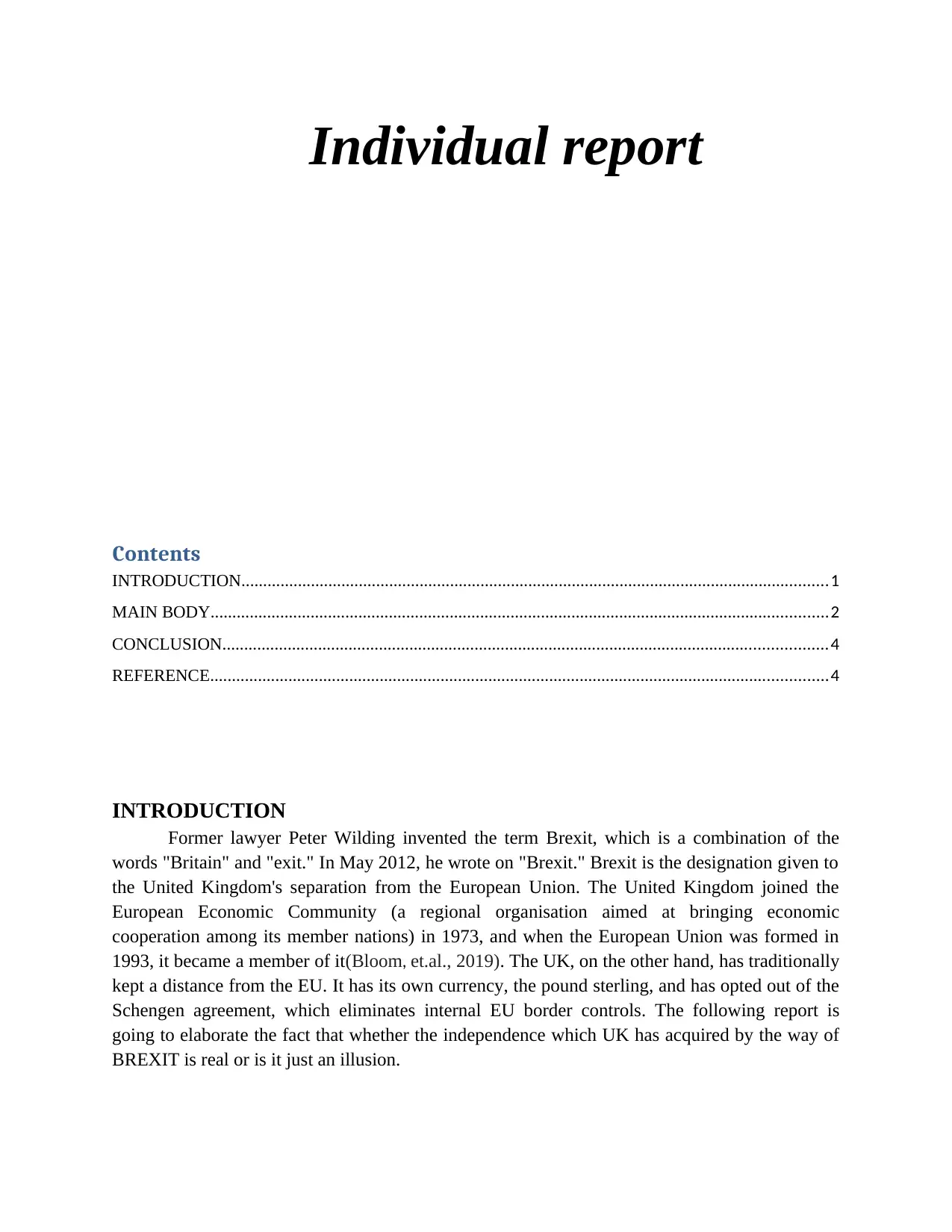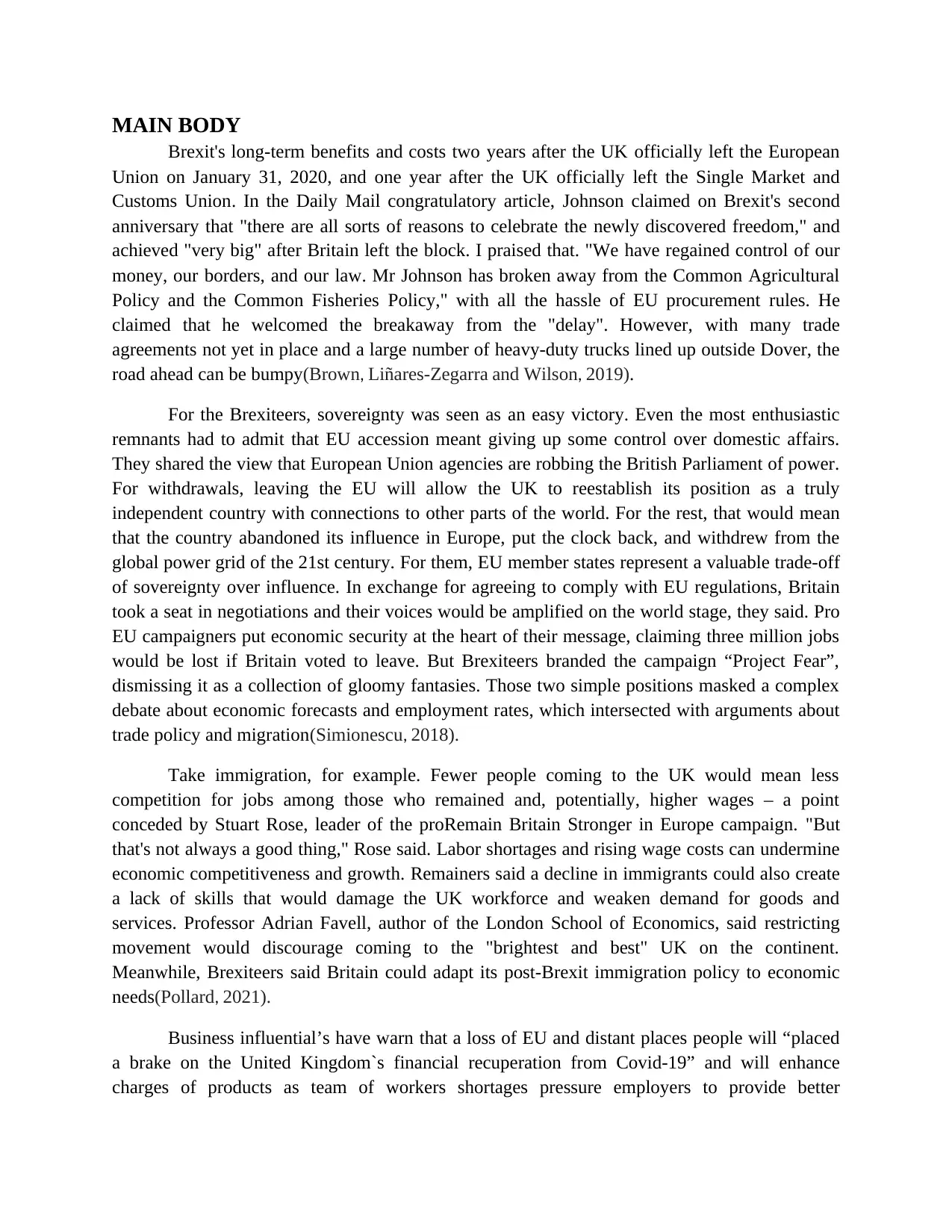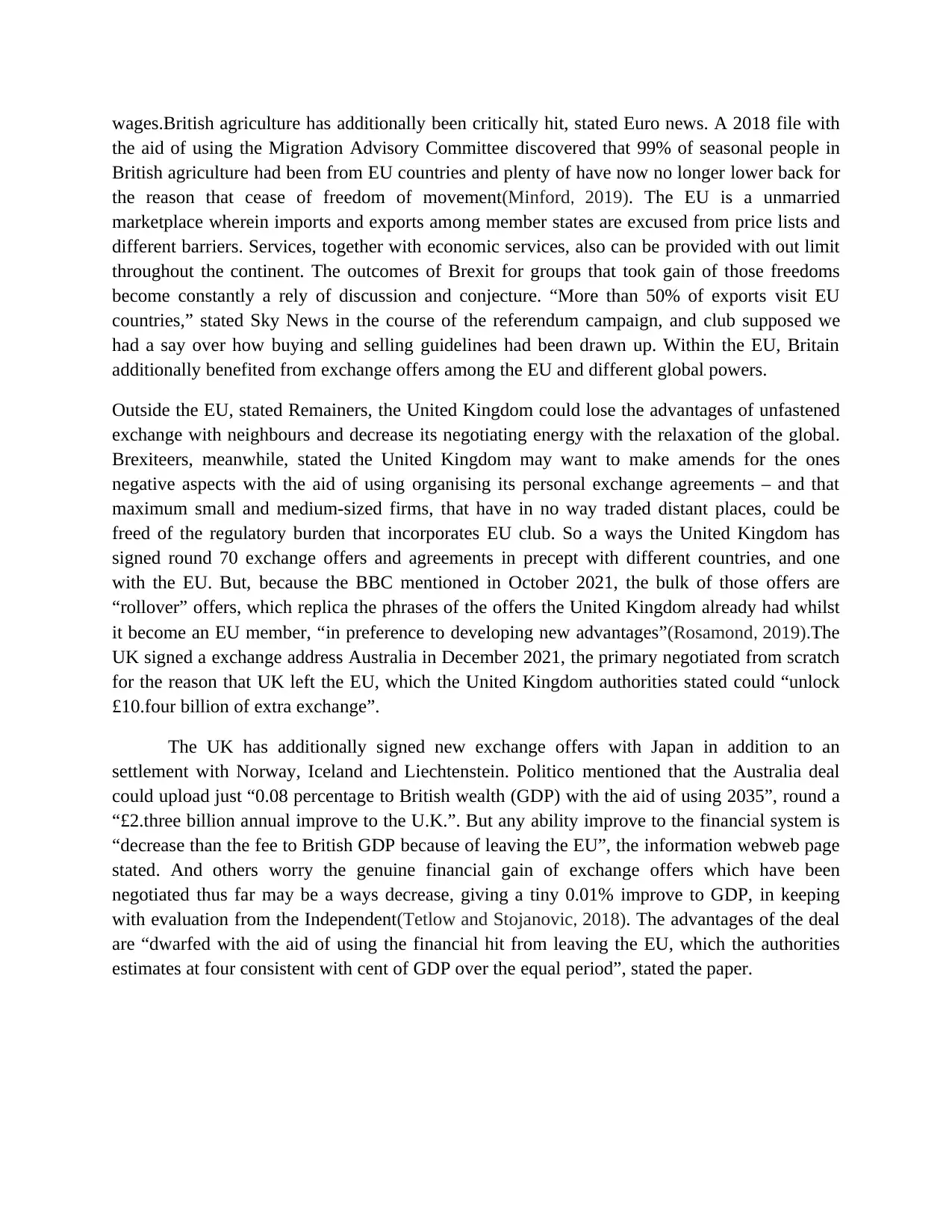Brexit's Economic Impact: Dissecting the Reality of UK Independence
VerifiedAdded on 2023/06/11
|5
|1664
|330
Report
AI Summary
This report critically examines the economic consequences of Brexit, questioning whether the UK's proclaimed independence is a tangible reality or merely an illusion. It delves into the long-term costs and benefits two years after the official departure from the European Union, scrutinizing claims of re...

Individual report
Contents
INTRODUCTION.......................................................................................................................................1
MAIN BODY..............................................................................................................................................2
CONCLUSION...........................................................................................................................................4
REFERENCE..............................................................................................................................................4
INTRODUCTION
Former lawyer Peter Wilding invented the term Brexit, which is a combination of the
words "Britain" and "exit." In May 2012, he wrote on "Brexit." Brexit is the designation given to
the United Kingdom's separation from the European Union. The United Kingdom joined the
European Economic Community (a regional organisation aimed at bringing economic
cooperation among its member nations) in 1973, and when the European Union was formed in
1993, it became a member of it(Bloom, et.al., 2019). The UK, on the other hand, has traditionally
kept a distance from the EU. It has its own currency, the pound sterling, and has opted out of the
Schengen agreement, which eliminates internal EU border controls. The following report is
going to elaborate the fact that whether the independence which UK has acquired by the way of
BREXIT is real or is it just an illusion.
Contents
INTRODUCTION.......................................................................................................................................1
MAIN BODY..............................................................................................................................................2
CONCLUSION...........................................................................................................................................4
REFERENCE..............................................................................................................................................4
INTRODUCTION
Former lawyer Peter Wilding invented the term Brexit, which is a combination of the
words "Britain" and "exit." In May 2012, he wrote on "Brexit." Brexit is the designation given to
the United Kingdom's separation from the European Union. The United Kingdom joined the
European Economic Community (a regional organisation aimed at bringing economic
cooperation among its member nations) in 1973, and when the European Union was formed in
1993, it became a member of it(Bloom, et.al., 2019). The UK, on the other hand, has traditionally
kept a distance from the EU. It has its own currency, the pound sterling, and has opted out of the
Schengen agreement, which eliminates internal EU border controls. The following report is
going to elaborate the fact that whether the independence which UK has acquired by the way of
BREXIT is real or is it just an illusion.
Paraphrase This Document
Need a fresh take? Get an instant paraphrase of this document with our AI Paraphraser

MAIN BODY
Brexit's long-term benefits and costs two years after the UK officially left the European
Union on January 31, 2020, and one year after the UK officially left the Single Market and
Customs Union. In the Daily Mail congratulatory article, Johnson claimed on Brexit's second
anniversary that "there are all sorts of reasons to celebrate the newly discovered freedom," and
achieved "very big" after Britain left the block. I praised that. "We have regained control of our
money, our borders, and our law. Mr Johnson has broken away from the Common Agricultural
Policy and the Common Fisheries Policy," with all the hassle of EU procurement rules. He
claimed that he welcomed the breakaway from the "delay". However, with many trade
agreements not yet in place and a large number of heavy-duty trucks lined up outside Dover, the
road ahead can be bumpy(Brown, Liñares-Zegarra and Wilson, 2019).
For the Brexiteers, sovereignty was seen as an easy victory. Even the most enthusiastic
remnants had to admit that EU accession meant giving up some control over domestic affairs.
They shared the view that European Union agencies are robbing the British Parliament of power.
For withdrawals, leaving the EU will allow the UK to reestablish its position as a truly
independent country with connections to other parts of the world. For the rest, that would mean
that the country abandoned its influence in Europe, put the clock back, and withdrew from the
global power grid of the 21st century. For them, EU member states represent a valuable trade-off
of sovereignty over influence. In exchange for agreeing to comply with EU regulations, Britain
took a seat in negotiations and their voices would be amplified on the world stage, they said. Pro
EU campaigners put economic security at the heart of their message, claiming three million jobs
would be lost if Britain voted to leave. But Brexiteers branded the campaign “Project Fear”,
dismissing it as a collection of gloomy fantasies. Those two simple positions masked a complex
debate about economic forecasts and employment rates, which intersected with arguments about
trade policy and migration(Simionescu, 2018).
Take immigration, for example. Fewer people coming to the UK would mean less
competition for jobs among those who remained and, potentially, higher wages – a point
conceded by Stuart Rose, leader of the proRemain Britain Stronger in Europe campaign. "But
that's not always a good thing," Rose said. Labor shortages and rising wage costs can undermine
economic competitiveness and growth. Remainers said a decline in immigrants could also create
a lack of skills that would damage the UK workforce and weaken demand for goods and
services. Professor Adrian Favell, author of the London School of Economics, said restricting
movement would discourage coming to the "brightest and best" UK on the continent.
Meanwhile, Brexiteers said Britain could adapt its post-Brexit immigration policy to economic
needs(Pollard, 2021).
Business influential’s have warn that a loss of EU and distant places people will “placed
a brake on the United Kingdom`s financial recuperation from Covid-19” and will enhance
charges of products as team of workers shortages pressure employers to provide better
Brexit's long-term benefits and costs two years after the UK officially left the European
Union on January 31, 2020, and one year after the UK officially left the Single Market and
Customs Union. In the Daily Mail congratulatory article, Johnson claimed on Brexit's second
anniversary that "there are all sorts of reasons to celebrate the newly discovered freedom," and
achieved "very big" after Britain left the block. I praised that. "We have regained control of our
money, our borders, and our law. Mr Johnson has broken away from the Common Agricultural
Policy and the Common Fisheries Policy," with all the hassle of EU procurement rules. He
claimed that he welcomed the breakaway from the "delay". However, with many trade
agreements not yet in place and a large number of heavy-duty trucks lined up outside Dover, the
road ahead can be bumpy(Brown, Liñares-Zegarra and Wilson, 2019).
For the Brexiteers, sovereignty was seen as an easy victory. Even the most enthusiastic
remnants had to admit that EU accession meant giving up some control over domestic affairs.
They shared the view that European Union agencies are robbing the British Parliament of power.
For withdrawals, leaving the EU will allow the UK to reestablish its position as a truly
independent country with connections to other parts of the world. For the rest, that would mean
that the country abandoned its influence in Europe, put the clock back, and withdrew from the
global power grid of the 21st century. For them, EU member states represent a valuable trade-off
of sovereignty over influence. In exchange for agreeing to comply with EU regulations, Britain
took a seat in negotiations and their voices would be amplified on the world stage, they said. Pro
EU campaigners put economic security at the heart of their message, claiming three million jobs
would be lost if Britain voted to leave. But Brexiteers branded the campaign “Project Fear”,
dismissing it as a collection of gloomy fantasies. Those two simple positions masked a complex
debate about economic forecasts and employment rates, which intersected with arguments about
trade policy and migration(Simionescu, 2018).
Take immigration, for example. Fewer people coming to the UK would mean less
competition for jobs among those who remained and, potentially, higher wages – a point
conceded by Stuart Rose, leader of the proRemain Britain Stronger in Europe campaign. "But
that's not always a good thing," Rose said. Labor shortages and rising wage costs can undermine
economic competitiveness and growth. Remainers said a decline in immigrants could also create
a lack of skills that would damage the UK workforce and weaken demand for goods and
services. Professor Adrian Favell, author of the London School of Economics, said restricting
movement would discourage coming to the "brightest and best" UK on the continent.
Meanwhile, Brexiteers said Britain could adapt its post-Brexit immigration policy to economic
needs(Pollard, 2021).
Business influential’s have warn that a loss of EU and distant places people will “placed
a brake on the United Kingdom`s financial recuperation from Covid-19” and will enhance
charges of products as team of workers shortages pressure employers to provide better

wages.British agriculture has additionally been critically hit, stated Euro news. A 2018 file with
the aid of using the Migration Advisory Committee discovered that 99% of seasonal people in
British agriculture had been from EU countries and plenty of have now no longer lower back for
the reason that cease of freedom of movement(Minford, 2019). The EU is a unmarried
marketplace wherein imports and exports among member states are excused from price lists and
different barriers. Services, together with economic services, also can be provided with out limit
throughout the continent. The outcomes of Brexit for groups that took gain of those freedoms
become constantly a rely of discussion and conjecture. “More than 50% of exports visit EU
countries,” stated Sky News in the course of the referendum campaign, and club supposed we
had a say over how buying and selling guidelines had been drawn up. Within the EU, Britain
additionally benefited from exchange offers among the EU and different global powers.
Outside the EU, stated Remainers, the United Kingdom could lose the advantages of unfastened
exchange with neighbours and decrease its negotiating energy with the relaxation of the global.
Brexiteers, meanwhile, stated the United Kingdom may want to make amends for the ones
negative aspects with the aid of using organising its personal exchange agreements – and that
maximum small and medium-sized firms, that have in no way traded distant places, could be
freed of the regulatory burden that incorporates EU club. So a ways the United Kingdom has
signed round 70 exchange offers and agreements in precept with different countries, and one
with the EU. But, because the BBC mentioned in October 2021, the bulk of those offers are
“rollover” offers, which replica the phrases of the offers the United Kingdom already had whilst
it become an EU member, “in preference to developing new advantages”(Rosamond, 2019).The
UK signed a exchange address Australia in December 2021, the primary negotiated from scratch
for the reason that UK left the EU, which the United Kingdom authorities stated could “unlock
£10.four billion of extra exchange”.
The UK has additionally signed new exchange offers with Japan in addition to an
settlement with Norway, Iceland and Liechtenstein. Politico mentioned that the Australia deal
could upload just “0.08 percentage to British wealth (GDP) with the aid of using 2035”, round a
“£2.three billion annual improve to the U.K.”. But any ability improve to the financial system is
“decrease than the fee to British GDP because of leaving the EU”, the information webweb page
stated. And others worry the genuine financial gain of exchange offers which have been
negotiated thus far may be a ways decrease, giving a tiny 0.01% improve to GDP, in keeping
with evaluation from the Independent(Tetlow and Stojanovic, 2018). The advantages of the deal
are “dwarfed with the aid of using the financial hit from leaving the EU, which the authorities
estimates at four consistent with cent of GDP over the equal period”, stated the paper.
the aid of using the Migration Advisory Committee discovered that 99% of seasonal people in
British agriculture had been from EU countries and plenty of have now no longer lower back for
the reason that cease of freedom of movement(Minford, 2019). The EU is a unmarried
marketplace wherein imports and exports among member states are excused from price lists and
different barriers. Services, together with economic services, also can be provided with out limit
throughout the continent. The outcomes of Brexit for groups that took gain of those freedoms
become constantly a rely of discussion and conjecture. “More than 50% of exports visit EU
countries,” stated Sky News in the course of the referendum campaign, and club supposed we
had a say over how buying and selling guidelines had been drawn up. Within the EU, Britain
additionally benefited from exchange offers among the EU and different global powers.
Outside the EU, stated Remainers, the United Kingdom could lose the advantages of unfastened
exchange with neighbours and decrease its negotiating energy with the relaxation of the global.
Brexiteers, meanwhile, stated the United Kingdom may want to make amends for the ones
negative aspects with the aid of using organising its personal exchange agreements – and that
maximum small and medium-sized firms, that have in no way traded distant places, could be
freed of the regulatory burden that incorporates EU club. So a ways the United Kingdom has
signed round 70 exchange offers and agreements in precept with different countries, and one
with the EU. But, because the BBC mentioned in October 2021, the bulk of those offers are
“rollover” offers, which replica the phrases of the offers the United Kingdom already had whilst
it become an EU member, “in preference to developing new advantages”(Rosamond, 2019).The
UK signed a exchange address Australia in December 2021, the primary negotiated from scratch
for the reason that UK left the EU, which the United Kingdom authorities stated could “unlock
£10.four billion of extra exchange”.
The UK has additionally signed new exchange offers with Japan in addition to an
settlement with Norway, Iceland and Liechtenstein. Politico mentioned that the Australia deal
could upload just “0.08 percentage to British wealth (GDP) with the aid of using 2035”, round a
“£2.three billion annual improve to the U.K.”. But any ability improve to the financial system is
“decrease than the fee to British GDP because of leaving the EU”, the information webweb page
stated. And others worry the genuine financial gain of exchange offers which have been
negotiated thus far may be a ways decrease, giving a tiny 0.01% improve to GDP, in keeping
with evaluation from the Independent(Tetlow and Stojanovic, 2018). The advantages of the deal
are “dwarfed with the aid of using the financial hit from leaving the EU, which the authorities
estimates at four consistent with cent of GDP over the equal period”, stated the paper.
⊘ This is a preview!⊘
Do you want full access?
Subscribe today to unlock all pages.

Trusted by 1+ million students worldwide

CONCLUSION
The conclusion is clear and in many respects not surprising. The report focuses on the feasibility
of the "sovereignty" story and questioned the (many) ways the British government vindicated
Brexit's decision on the basis of sovereignty. We have shown that the freedom to set up our own
trading rules is quite costly and is not absolute, even within the WTO. A very factual menace is
that at each phase of the UK's Brexit process, the UK sought to replace the actual forces needed
to set the European and worldwide principles for "chimera."
REFERENCE
Bloom, N.,et.al., 2019. The impact of Brexit on UK firms (No. w26218). National Bureau of
Economic Research.
Brown, R., Liñares-Zegarra, J. and Wilson, J.O., 2019. The (potential) impact of Brexit on UK
SMEs: regional evidence and public policy implications. Regional Studies, 53(5), pp.761-770.
Simionescu, M., 2018. The impact of Brexit on the UK inwards FDI. Economics, management
and sustainability, 3(1), pp.6-20.
Pollard, J.S., 2021. Brexit and the wider UK economy. Geoforum, 125, pp.197-198.
Minford, P., 2019. The effects of Brexit on the UK economy (No. E2019/1). Cardiff Economics
Working Papers.
The conclusion is clear and in many respects not surprising. The report focuses on the feasibility
of the "sovereignty" story and questioned the (many) ways the British government vindicated
Brexit's decision on the basis of sovereignty. We have shown that the freedom to set up our own
trading rules is quite costly and is not absolute, even within the WTO. A very factual menace is
that at each phase of the UK's Brexit process, the UK sought to replace the actual forces needed
to set the European and worldwide principles for "chimera."
REFERENCE
Bloom, N.,et.al., 2019. The impact of Brexit on UK firms (No. w26218). National Bureau of
Economic Research.
Brown, R., Liñares-Zegarra, J. and Wilson, J.O., 2019. The (potential) impact of Brexit on UK
SMEs: regional evidence and public policy implications. Regional Studies, 53(5), pp.761-770.
Simionescu, M., 2018. The impact of Brexit on the UK inwards FDI. Economics, management
and sustainability, 3(1), pp.6-20.
Pollard, J.S., 2021. Brexit and the wider UK economy. Geoforum, 125, pp.197-198.
Minford, P., 2019. The effects of Brexit on the UK economy (No. E2019/1). Cardiff Economics
Working Papers.
Paraphrase This Document
Need a fresh take? Get an instant paraphrase of this document with our AI Paraphraser

Rosamond, B., 2019. Brexit and the politics of UK growth models. New political
economy, 24(3), pp.408-421.
Tetlow, G. and Stojanovic, A., 2018. Understanding the economic impact of Brexit. Institute for
government, pp.2-76.
economy, 24(3), pp.408-421.
Tetlow, G. and Stojanovic, A., 2018. Understanding the economic impact of Brexit. Institute for
government, pp.2-76.
1 out of 5
Related Documents
Your All-in-One AI-Powered Toolkit for Academic Success.
+13062052269
info@desklib.com
Available 24*7 on WhatsApp / Email
![[object Object]](/_next/static/media/star-bottom.7253800d.svg)
Unlock your academic potential
© 2024 | Zucol Services PVT LTD | All rights reserved.



